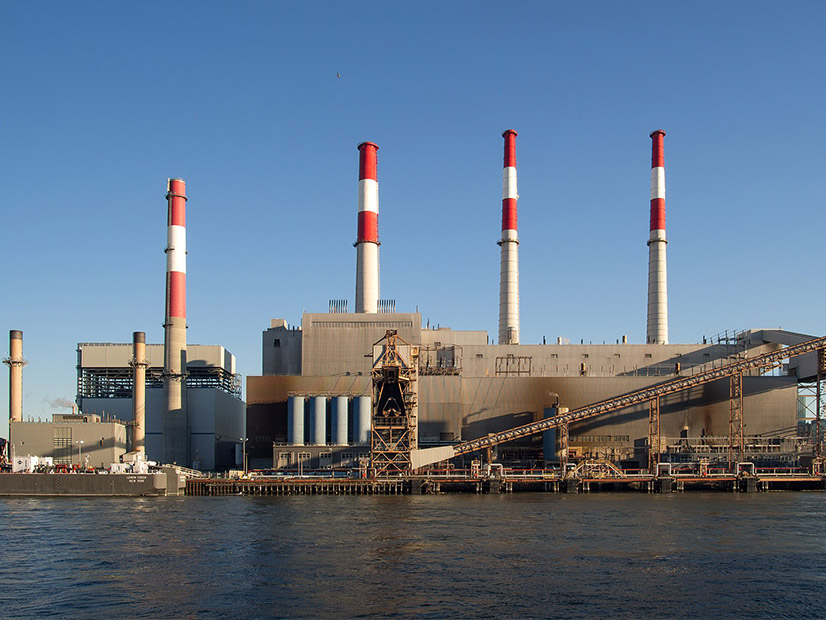FERC approved a policy statement Thursday on how it would review carbon pricing proposals in organized wholesale electricity markets, but there’s no indication it will be put to the test anytime soon (AD20-14).
The commission proposed a policy in October for considering market rules suggested by RTOs/ISOs for incorporating state-determined carbon prices. (See FERC: Send Us Your Carbon Pricing Plans.)
Chairman Richard Glick and Commissioner Allison Clements, both Democrats, voted to approve the statement, along with Republican Neil Chatterjee. Republicans James Danly and Mark Christie each concurred in part and dissented in part.
Chatterjee was chairman when the commission proposed the policy in October, just two weeks after holding a technical conference on the issue. Most panelists at the conference urged the commission to support state and RTO efforts to introduce carbon pricing while saying a uniform national price regime authorized by Congress would be preferable. (See FERC Urged to Embrace Carbon Pricing.)

The Analysis Group’s study concluded that New England needs a carbon price of $25 to $35/short ton by 2025, rising to $55 to $70 by 2030, to meet New England states’ carbon emissions goals. | Analysis Group
The commission said that 12 states currently use carbon pricing as a market-based tool to reduce greenhouse gas emissions.
The policy statement, which takes effect immediately, says that wholesale market rules incorporating a carbon price could be within the commission’s jurisdiction under Section 205 of the Federal Power Act (FPA). While the policy statement provides guidance on how FERC would review future proposals, the commission said any rulings would depend on the “facts and circumstances” presented.
“The policy statement serves a useful purpose in discussing how the commission might accommodate a state-determined carbon pricing program [but] the devil is always in the details,” Glick said at FERC’s open meeting. “Until we get a specific request to act, I do not think there’s much benefit to weighing in on further hypotheticals.”
Chatterjee praised the bipartisan vote in support of the statement.
“Carbon pricing has emerged as an important market-based tool that can be deployed to reduce carbon emissions in an efficient and transparent manner — one of those rare policy tools that attracts support from across the political spectrum,” Chatterjee said, noting endorsements of the concept by groups including the Union of Concerned Scientists, the Business Roundtable, the U.S. Chamber of Commerce and, most recently, the American Petroleum Institute.
But Glick acknowledged that New York and the states within ISO-NE and PJM have not taken any steps to implement such programs.
“It’s not entirely clear to me that what we did today is going to have any bearing on the states’ decisions on whether to pursue carbon pricing or not,” he said in a press conference after the meeting.
Danly said although he concurred in the order, “there’s little actual substance behind it. It’s an aspirational goal to be sure. But it doesn’t really amount to very much other than a repetition that people are able to enjoy their [Section] 205 filing rights.”
For his part, Christie said the commission should refer to such proposals as a “carbon tax.”
“Let’s get the labeling right so the public understands what’s going on here. It isn’t just semantics: It helps to clarify the legal and constitutional issues, particularly with regard to FERC’s authority as we consider these proposals,” he said. “Let’s have truth in labeling and not use euphemisms.”
Reaction
Clean energy groups welcomed FERC’s action.
“Today’s policy statement demonstrates an understanding by FERC leadership that the economic design of our nation’s wholesale energy markets is inseparable from our climate reality,” said Gregory Wetstone, CEO of the American Council on Renewable Energy. “Pricing carbon not only sends market signals to emitting resources that they should retire, but also drives investment in new, low-carbon resources by helping them compete. … I encourage electricity market stakeholders to quickly begin assessing their options to develop carbon pricing proposals under this new framework.”

The Ravenswood Generating Station now run by Rise Light & Power, as seen from a neighboring street in Roosevelt Island | Rhododendrites, CC BY-SA 4.0, via Wikimedia Commons
Gene Grace, general counsel for the American Clean Power Association, cited the “overwhelming consensus … that carbon pricing in markets is a powerful and cost-effective tool to drive down emissions and achieve state policy goals while preserving the benefits of competition.”
But ClearView Energy Partners told its clients that the commission’s action is unlikely to open a floodgate of proposals.
“Ahead of any such filing, stakeholders must develop and endorse them, and such debates have been contentious and slow-moving,” ClearView said. “Outside of California, which has already implemented a carbon price into its wholesale market, New York — as a single-state market — appears to represent the next best opportunity to test `integrating’ state policies into a regional market via carbon pricing policies.
“We think it also illustrates the difficulty of finding consensus even among a state’s own policymakers. It appears that Gov. Andrew Cuomo’s (D-NY) unwillingness to endorse the proposal has caused it to stall.”




